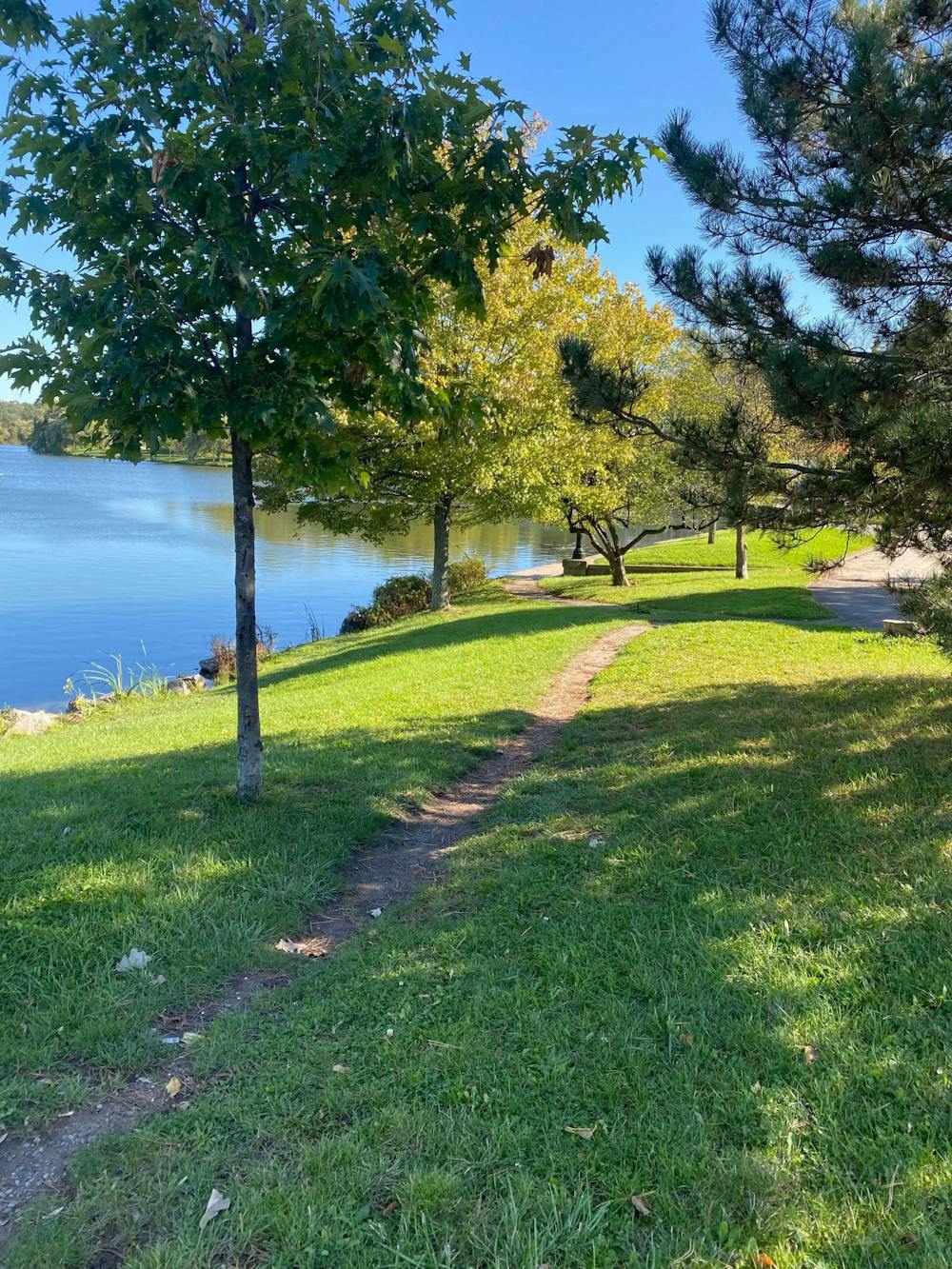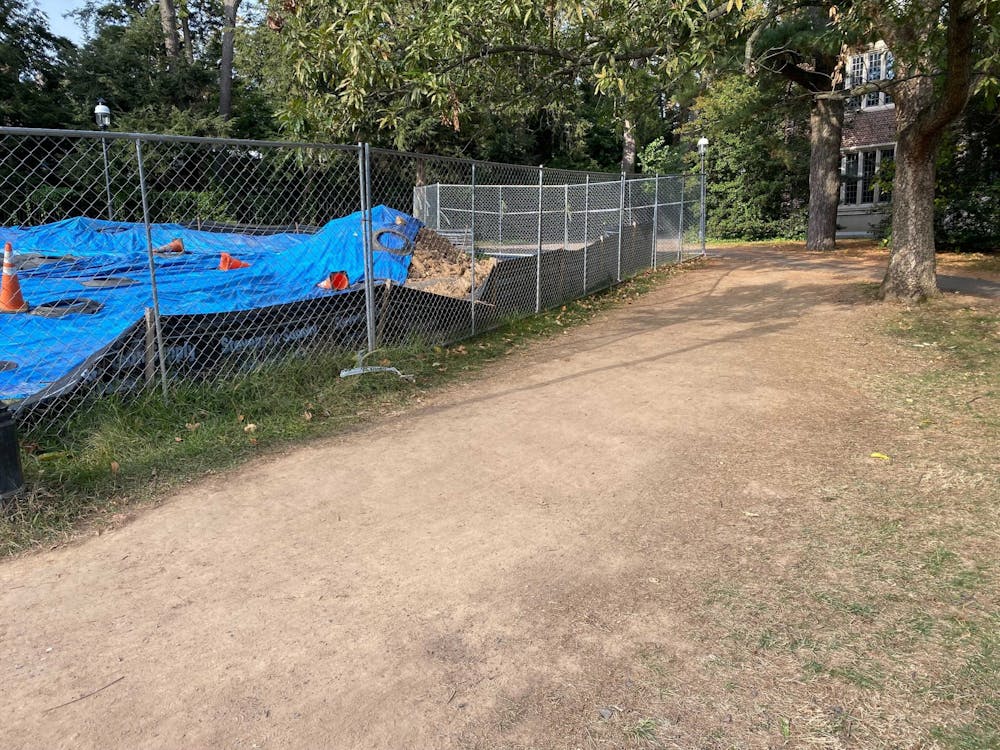Just south of Prospect Garden and just north of First College, around the art museum construction site, there’s a beautiful phenomenon of the human condition.
There are sidewalks that cross this area in an X-shape. These sidewalks connect First College to Frist Campus Center and McCosh Hall headed northeast, and Rocky, Mathey, and the U-Store headed northwest. It’s in the dead center of campus and an important pedestrian thoroughfare.
There’s a fence around the construction site that blocks the paths. So instead, many people just walked around it. People still have to get where they’re going, and a college student has neither the time nor reverence to find an indirect route that stays on the sidewalk. So they — we, I should say, as I walk this way, too — just walked or biked or scootered along the edge of the fence. Over time, we all decided to walk in the same place, making a new path of the same size, in the same direction as the old sidewalk. After the old sidewalk was blocked off, we all made a new one together.
In the field of urban planning, this is technically called a desire path. Desire paths arise when preplanned walkways are inadequate or have gaps — such as the fence around the construction by Prospect Garden. Desire paths are often paved over when they’ve been used enough; many of the diagonal paths crossing quads on campus may have once been desire paths.

Gabriel Robare / The Daily Princetonian
All my classes are in either McCosh Hall, Robertson Hall, or 1879 Hall, and I live in 1939 Hall. So I walk along these desire paths every day and have spent a lot of time thinking about them. I often think of a certain paragraph as I’m walking — a lot of which I’ve committed to memory by coming back to it so much. It’s near the end of Henry David Thoreau’s “Walden.” If you haven’t read it (and it’s well, well worth the read if you haven’t), Thoreau writes about how he lives in a secluded cabin in the woods for two years to live life to the fullest. At the end of the text, he chooses to leave the woods:
I left the woods for as good a reason as I went there. Perhaps it seemed to me that I had several more lives to live, and could not spare any more time for that one. It is remarkable how easily and insensibly we fall into a particular route, and make a beaten track for ourselves. I had not lived there a week before my feet wore a path from my door to the pond-side; and though it is five or six years since I trod it, it is still quite distinct. It is true, I fear, that others may have fallen into it, and helped to keep it open. The surface of the earth is soft and impressible by the feet of men; and so with the paths which the mind travels. How worn and dusty, then, must be the highways of the world, how deep the ruts of tradition and conformity! I did not wish to take a cabin passage, but rather to go before the mast and on the deck of the world, for there I could best see the moonlight amid the mountains. I do not wish to go below now.
This, I would think, would have us think negatively about desire paths. Are we all but sheep, walking along the same paths? Are we just moths taking the shortest, most direct route to the flame in McCosh Hall? If Thoreau was on campus with us, he might tell us that instead of all walking on the same path, we should all take a different winding route through the field. But I think that would be a simplified and incorrect reading of this paragraph — and indeed a simplified and incorrect way to look at the world.

In my life, I like patterns and routines. The world is complex and unpredictable, so I like to make plans and systems to handle it. I believed this to be one of my core projects, at the firm core of my integrity. If I chose an adjective to describe myself, I would say I was an organized person. But I realized this was not quite accurate.
It is not that I like patterns and routines: I like making patterns and routines. I like to cobble together order where there once was chaos. I am not an organized person. I am an organizing person, present tense. Having patterns and having routines is pleasant, safe, and easy — but also final, thoughtless, and uninteresting.
What I really like, then, is to be presented with disorder and to create order, because it takes thought and action. After I find the solution I may rest in a moment of clarity — then find another route to chart. In other words, I make desire paths. I strike out into the field of the world and tread deliberately till I feel the path form beneath my feet. Once it starts to feel “worn and dusty,” I turn toward thick vegetation again.
Thoreau didn’t mean to say that either well-worn paths nor the empty wilderness is better. What is better is neither the untrodden path nor the trodden one — it is the making of the untrodden path into the trodden one that is best. We should look cautiously on the paths that already exist, for it is better to create our own. That way, as Thoreau writes, we can “best see the moonlight amid the mountains.”

Here on campus, we’ve been knocked off course. We can’t walk the same sidewalk we’ve been on — and campus today, thanks to factors too many to name, is different than ever before. One could say that we’re forced onto a new path, made to walk through the mud and grass because our old, easy sidewalk has been taken away. But I think Thoreau reminds us that being forced off the sidewalk is an opportunity to create a new path. Together, walking through the grass, we find a route where none was given. Together, we choose the path we desire.
Gabriel Robare is a Senior Writer for The Prospect, co-Head Editor of the Puzzles section, and a Contributing News Writer at the ‘Prince,’ who often covers literature and the self. He can be reached at grobare@princeton.edu, and on Instagram and Twitter at @gabrielrobare. He previously served as an Associate Sports Editor.








